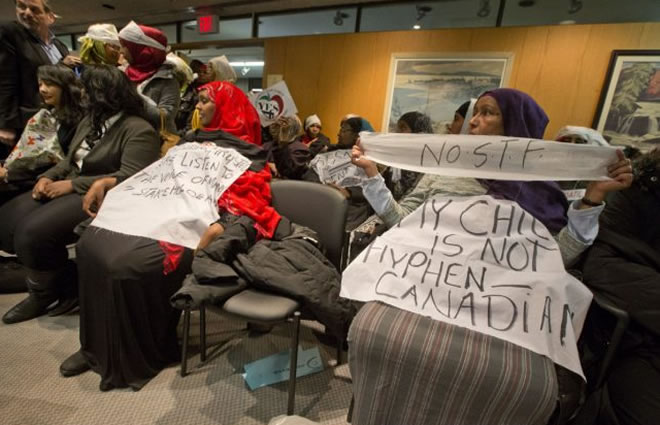
A move by TDSB to begin hammering out an action plan to offer Somali students more help sparked an outcry among dozens of Somali parents, who claim it will stigmatize their community.

Louise Brown GTA, Education Schools
Thursday, March 06, 2014
A move by the Toronto District School Board to begin hammering out an action plan to offer Somali students more help sparked an outcry among dozens of Somali parents who came to a meeting Wednesday night to oppose the extra help, claiming it will stigmatize them.
“They’re trying to say Somali kids need more help, but they don’t,” said Hawa Jilal, who said she doesn’t believe the board’s claim that 25 per cent of Somali-Canadian students drop out.
“The sample was too small — it was only about 100 students out of 6,000 of Somali heritage.”
The proposals are the result of a special 22-person task force the board created a year ago at the request of Somali families who wanted more support for their children. TDSB statistics suggest that students of Somali descent are 50 per cent more likely to be suspended, placed in special education classes, and have lower scores on standardized tests. Data suggests they are also less likely to apply to college and university than the board average.
Nearly half the task force is made up of parents who said the recommendations have widespread support among the Somali community. However some critics — including a number of star Somali-Canadian students who are currently in graduate school — argue special help is not needed and will further stigmatize their community. Supporters note the help is optional for those who want it or feel they need it.
The task force proposals are similar to those made to help support other groups of students who face demographic hurdles to learning. Portuguese-Canadian students also are more likely to quit school early, and a special task force was struck last year that came up with similar recommendations for more support for students of Portuguese background, more homework help and role models and encouragement from teachers.
Similarly the higher dropout rate among black students was the reason behind the board creating an unusual Africentric alternative elementary school in 2009 to try to combine all these extra supports into one alternative school - from role models to lesson plans that largely spotlight black culture and heritage.
This too was highly divisive among the black community, which warmed of “segregation,” although the school is open to all, is optional for those who want to attend and has won kudos for engaging students.
Other groups that have drawn special study because of lagging performance include children of Spanish-speaking heritage, and also Filipino students.
There is a growing body of research that suggests students in groups that lag behind face a lack of opportunity - the “opportunity gap” - and boards are increasingly targeting extra supports for these groups to level the academic playing field.
But in many cases, these moves do divide the communities.
Source: Toronto Star